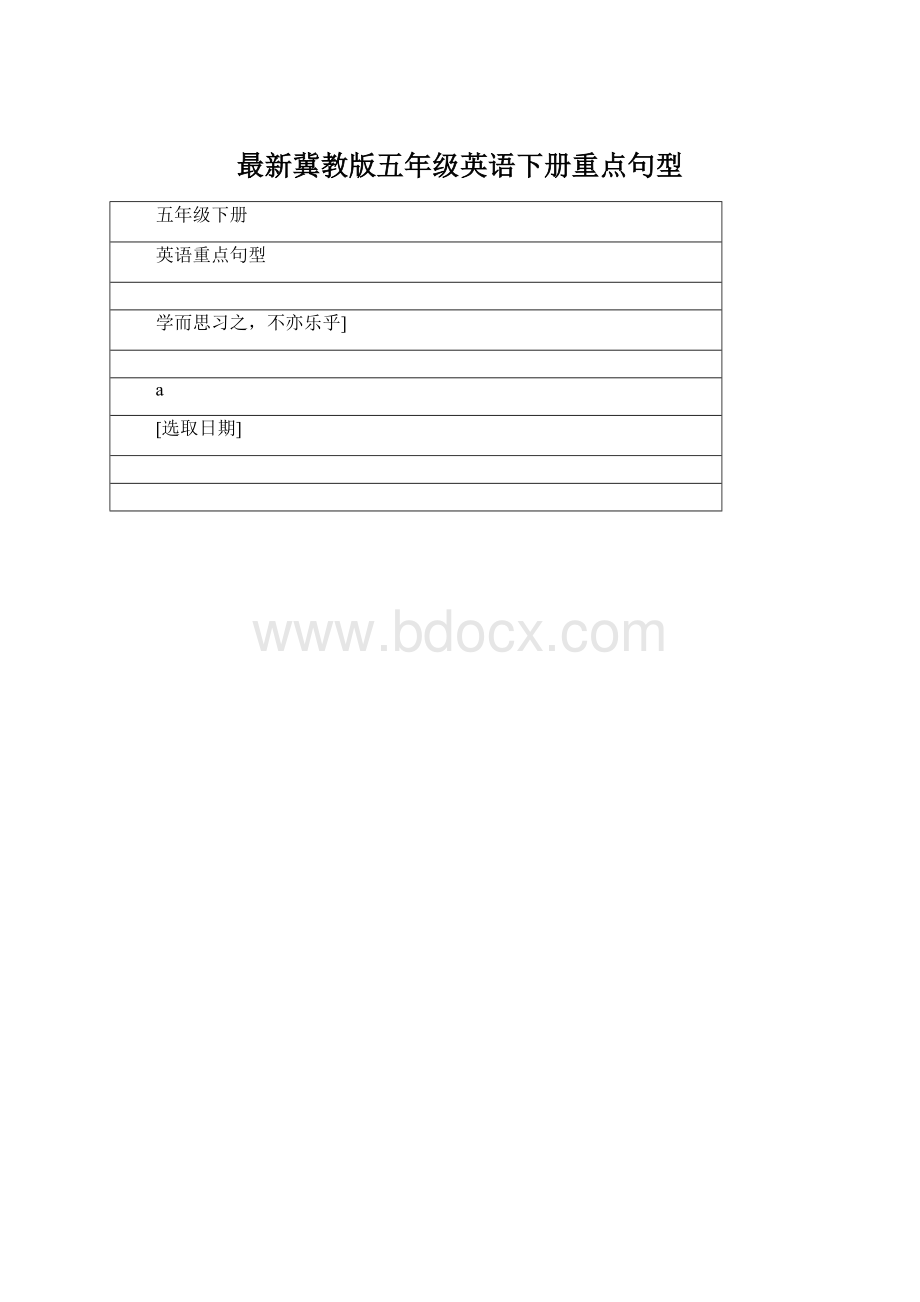最新冀教版五年级英语下册重点句型.docx
《最新冀教版五年级英语下册重点句型.docx》由会员分享,可在线阅读,更多相关《最新冀教版五年级英语下册重点句型.docx(12页珍藏版)》请在冰豆网上搜索。

最新冀教版五年级英语下册重点句型
五年级下册
英语重点句型
学而思习之,不亦乐乎]
a
[选取日期]
五年级下册Unit1
run--runningsorryjump--jumpingsing--singingdance---dancingsit---sittingsitdown
standupstand---standingsee—seeinglook---lookinglookoutoflookatboy—boysgirl--girlsnowdraw---drawingpicture---pictureswoman--womenbaby---babiescry--cryingtalk---talkingman--mensleep---sleepingwhohungry---fullteawatercandy
arriveaskcan---couldcard—playcardswithJennydumpling—dumplings—makedumplingsexcitedfindfootball---playfootballforgetfun---havefunhotellostmeMr.Mrs.newspaperoroutpointsomesong---songs----singasongstationsurethankthemthenthere----herethirstyticket----ticketstrip---haveanicetripgood-bye---saygood-byetoyou
JennyandDannygotoBeijingtoday.
Dannyrunstothetrain.
Pleasestandup.
Pleasedon’tsitdown.
Whatdoyouseeonthetrain?
Iseemanytalltrees.
WhatisJennydoing?
Jennyislookingoutthewindowonthetrain.
Whatareyoudoingnow?
Iamdrawingapicture.
WhatisDannydoingnow?
Dannyissingingasongtoyourmother.
Whataretheydoing?
They’rehavingfun.
Whoistalking?
Dannyistalking////或It’sDanny.
Heistalkingtothemanbehindyou.
Whois….?
人is---或It’s….
Whoishungry?
Iamhungry.
Wouldyoulikesomefruit?
Yes,please.I’dlikeanappleandanorange.
Wouldyoulikesomewater?
No,thanks.I’dlikesometea.
Wouldyoulike…?
I’dlikesome….
Wouldyoulikeaglassofmilk?
Yes,please./No,thanks.
Jenny,Danny,LiMingandMr.LiaregoingonatriptoBeijing.
Theygotothetrain.
Theystandbesidethetrain.
Mr.Lidrivesthemtothetrainstation.
LiMinggetsthetickets.
Dannyrunstothetrain.
Dannyjumpsonthetrain.
Mr.Lisaysgood-byetothem.
Dannyislost.
Howmuchisthis/that?
Fouryuan.
Doyoulikethesebananasorthosebananas?
Unit2
peoplemanychild---childrenwoman---women
man---mensay---says---sayinghelp---helps---helpingworry—worryingsadtake—takes---taking
takeapictureforbusy---freeafraidtired
be---I_______------he_________---you_______----Mary_____feel---feels---feelingstop-stops---stoppingwait---waits---waitinganswerarmcareful---becarefulcheesedifficult---easyfallhighhundred—hundreds---hundredsofhurt—hurt----hurtkeepkilometer---kilometersletter----letterslucky---luckymoneymuch---moreneedold---older---oldestpalace---thePalaceMuseumpaperpoor---richscarf---scarfssendsky---ablueskysquare---Tian’anmenSquaretable---tablestail---tailsthing---thingsthousand---hundredtimetrue---trulyvisit----visitingwall---theGreatWall
LiMing,Danny,JennyandMrs.LiarriveinBeijingat1:
17intheafternoon.
Danny,JennyandLiMingarevisitingthePalaceMuseum.
Danny,Jenny,LiMingandMrs.LiareshoppingonWangfujingStreet.
Theyareontheirwaytothehotel.
Achildisflyingakite.
Somechildrenareplayingfootball.
Ayoungmanissing.
Someoldwomenaredancing.
Amanisrunning.
SomeoldmenaredoingTaiChi.
Somepeoplearetakingpicturesonthesquare.
Somemenareflyingkites.
Ihurtmyarm.
Jennycanflyherkiteveryhigh.
Dannycan’tflyakite.
Tian’anmenSquareisverybig.
ThePalaceisredandyellow.it’sbeautiful.
HowoldisthePalaceMuseum,LiMing?
It’saboutsixhundredyearsold.
TheGreatWallisfarfromourhotel.
TheGreatWallisveryoldandverylong.
Weneedtotakeabus.
HowoldistheGreatWall?
It’sabout2000yearsold.
Howlongisit?
(It’s)about6000kilometers.
Onthewaybacktothehotel,Dannyfeelstiredandhungry.
Jennybuysascarfforhermother,someteaforherfather,akiteforhersisterandacapforherbrother.
Whattimeisitnow?
Itis2:
30.
Let’skeepitcleanandbeautiful.
LetmewritemynameontheGreatWall.
Whatawonderfulpalacetovisit!
Unit3
much---howmuchwrite---writes---writingmumdaddearfineleft---ontheleft/lefthand
right---ontheright/righthandturn—turns--turningwrong---rightemail—anemail---sendanemail
idea---goodideacomputer—computersuse—usingkindus
addressCanadadateeveryoneexcuse---excuseme
firstgift=presenthome---gohome----athomelittle---littlegirllunch----haveluncho’clock---4o’clock
Ottawapostofficeput---putting----putonsentencesnow---snowysoonstampstraight---sitstraight---standstraighttell---tells---telling---toldtomorrow---today---yesterdaytraffictrue----trulywell
Apostcardhasapictureonit.
Thisisaletter.Wewritealetteronpaper.
Thisisanemail.Wewriteanemailonacomputer.
Jenny,DannyandLiMingwanttobuysomepostcards.
Iwanttosendthispostcardtomymumanddad.
DannyandJennywanttosendthepostcards.
Iwanttosendanemailtomyfather
Thereisacomputerintheroom.
Howmuchisthispostcard?
It’stwoyuan.
Howmucharethesepostcards?
Theyaretwentyyuan.
Iwilltakenine,please.
Wheredoyouwriteonapostcard?
Ontheleft.
Wheredoyouputtheaddress?
Ontheright.
Whereisthepostoffice?
Doyouknowwherethepostofficeis?
Gostraightdownthestreet.
Turnleftatthetrafficlights.
How’stheweatherinCanada?
Whatagreattrip!
Whatafuntrip!
Tomorrowyou’llgobacktoCanada.Wewillmissyou.
Don’tforgettowritetous.
Let’ssendanemailtomyfriendEmma!
Let’sgototherestauranttohavelunch
ThankyouforsendinganemaitoEmma.
ThisistheemailfromLittleZeke.
Unit4
story---storiesdo--didyesterday—today---tomorrow
night---dayhave--hadgo---goes---wentsee---sees---saweat---eats---atephoto---photosare--wereis--washappybuy---buys---boughtback
clsssdifferenceevery---everyday—everyyearfour---fourthhamburgerhappen---happenedlast---lastyear---lastweekoftenopen---close
party---haveapartysecondthirdtry----tryon
Didyouhaveanicetrip?
Yes!
Ihadagreattrip.
Whatdidyoudoyesterday?
IwalkedtoWangfujingStreet.
Weshoppedthere.
Iwantedtobuyagiftforyou.
Ilookedinmanyshops.
Ilikedthis.
Ioftenwalktoschool.
Iwalkedtotheparkyesterday.
IoftenwatchTVathome.
Iwatchedafilmlastnight.
Didyoumissme?
Yes,Idid.
DidyouhavefuninBeijing?
Yes,Ihadfun.
Whatdidyoudo?
Thefirstday,wewenttotheGreatWall.
Thesecondday,wewenttothePalaceMuseum.
Thethirdday,wewenttotheGreatWall.
Thefourthday,wewenttoWangfujing.
IgotothelibraryonSundays.
Iwenttothecinemayesterday.
IseeDannyeveryday.
IsawMr.Woodyesterday.
Ieatanappleeveryday.
Iateanorangeyesterday.
Heiseightyearsoldthisyear.
Hewassevenyearsoldlastyear.
Iamhappytoday!
Iwassadyesterday.
WeareinCanadathisweek.
WewereinChinalastweek’
WewereonthetraintoBeijing.
Weplayedwiththebaby.
Hehurthistail.Hewassad.
ThisisapictureofJennyandLiMing.
WeboughtgiftsforyouinBeijing.
Thiskiteisforyou,Steven.
Greenismyfavouritecolour.
It’stoosmallforme,butit’sgoodforababy.
小学生基础语法
语法小提示:
名词复数规则:
1.一般情况下,直接加-s,如:
book-books,bag-bags,cat-cats,bed-beds
2.以s.x.sh.ch结尾,加-es,如:
bus-buses,box-boxes,brush-brushes,watch-watches
3.以“辅音字母+y”结尾,变y为i,再加-es,如:
family-families,strawberry-strawberries
4.以“f或fe”结尾,变f或fe为v,再加-es,如:
knife-knives
5.不规则名词复数:
man-men,woman-women,policeman-policemen,policewoman-policewomen,mouse-mice;child-children;foot-feet,;tooth-teethfish-fish,people-people,Chinese-Chinese,Japanese-Japanese
语法小提示:
现在进行时基本用法介绍
1.现在进行时表示现在正在进行或发生的动作,也可表示当前一段时间内的活动或现阶段正在进行的动作。
2.现在进行时的肯定句基本结构为be+动词ing.
3.现在进行时的否定句在be后加not。
4.现在进行时的一般疑问句把be动词调到句首。
动词加ing的变化规则
1.一般情况下,直接加ing,如:
cook-cooking
2.以不发音的e结尾,去e加ing,如:
make-making,taste-tasting
3.如果末尾是一个元音字母和一个辅音字母,双写末尾的辅音字母,再加ing,如:
run-running,stop-stopping
一般现在时基本用法介绍
一般现在时的功能
1.表示事物或人物的特征、状态。
如:
Theskyisblue.天空是蓝色的。
2.表示经常性或习惯性的动作。
如:
Igetupatsixeveryday.我每天六点起床。
3.表示客观现实。
如:
Theearthgoesaroundthesun.地球绕着太阳转。
一般现在时的构成
1.be动词:
主语+be(am,is,are)+其它。
如:
Iamaboy.我是一个男孩。
2.行为动词:
主语+行为动词(+其它)。
如:
WestudyEnglish.我们学习英语。
当主语为第三人称单数(he,she,it)时,要在动词后加"-s"或"-es"。
如:
MarylikesChinese.玛丽喜欢汉语。
一般现在时基本用法介绍
1.be动词的变化。
否定句:
主语+be+not+其它。
如:
Heisnotaworker.他不是工人。
一般疑问句:
Be+主语+其它。
如:
-Areyouastudent?
-Yes.Iam./No,I'mnot.
特殊疑问句:
疑问词+一般疑问句。
如:
Whereismybike?
2.行为动词的变化。
否定句:
主语+don't(doesn't)+动词原形(+其它)。
如:
Idon'tlikebread.
当主语为第三人称单数时,要用doesn't构成否定句。
如:
Hedoesn'toftenplay.
一般疑问句:
Do(Does)+主语+动词原形+其它。
如:
-Doyouoftenplayfootball?
-Yes,Ido./No,Idon't.
当主语为第三人称单数时,要用does构成一般疑问句。
如:
-Doesshegotoworkbybike?
-Yes,shedoes./No,shedoesn't.
特殊疑问句:
疑问词+一般疑问句。
如:
Howdoesyourfathergotowork?
动词+s的变化规则
1.一般情况下,直接加-s,如:
cook-cooks,milk-milks
2.以s.x.sh.ch.o结尾,加-es,如:
guess-guesses,wash-washes,watch-watches,go-goes
3.以“辅音字母+y”结尾,变y为i,再加-es,如:
study-studies
一般过去时基本用法介绍
一般过去时常表示过去某一时间所发生的动作或存在的状态。
一般过去时常和表示过去的状语连用,如lastsummer,yesterday,lastweek,in1900,duringthenight,inthosedays等。
动词过去式的变法
1.一般情况下,在动词的词尾直接加—ed如:
walk--walked.
2.以不发音的字母e结尾的动词,在词尾直接加—d如:
like—liked.
3.以重读闭音节结尾的动词,变过去式时,需要双写末尾的字母,再加-ed如:
shop—shopped.
4.以辅音字母+y结尾的词,要变y为i,再+ed。
如:
study--studied
5.一些特殊的动词,变过去式时,需要变为另一个词.如:
go—went,do–did等等.
一般将来时基本用法如下:
一般将来时用来表示纯粹的将来事实。
一般将来时常和表示将来的时间连用如:
tomorrow,nextweek,nextmonth,nextyear等
如:
Hewillcomenextweek.他下个星期回来。